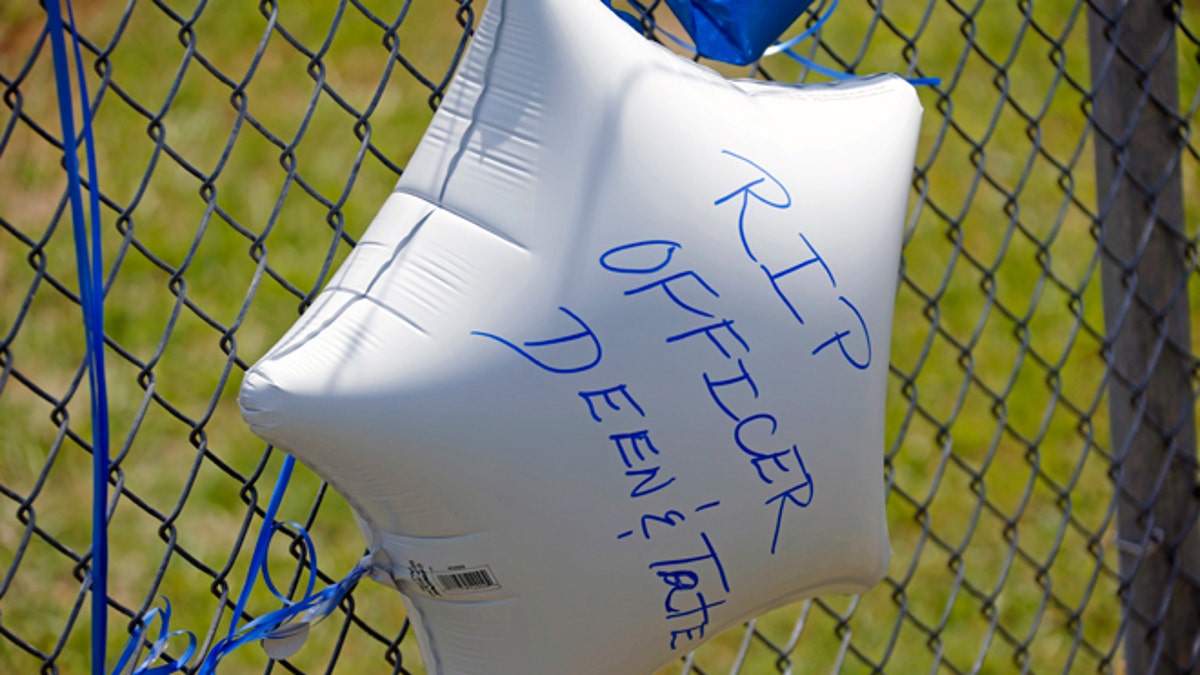
May 10, 2015: A memorial balloon with a personal message floats at a makeshift memorial in Hattiesburg, Miss. Two officers were shot to death during an evening traffic stop turned violent, a state law enforcement spokesman said Sunday. Three suspects were in custody, including two who are charged with capital murder. AP Photo/Rogelio V. Solis
On Friday, New York City Police Officer Brian Moore was laid to rest, after being shot in the head while sitting in an unmarked car. Just days before his shooting, PBS’s Tavis Smiley prophesied that “Protests and riots–uprisings–could become the new normal,” adding “Welcome to the new America.” As the Washington Post’s Richard Cohen has since noted, the data points also suggest “a worsening racial situation,” and that “should give us all cause for worry.” We ignore all this at our peril.
It may also be the case that urban anarchy becomes the new normal. But, if past is prelude, that won’t be the final word, politically: History tells us that going soft on crime is a surefire way for to lose an election.
Just ask Mike Dukakis, the Democrats’ failed 1988 presidential candidate, and David Dinkins, New York City’s one-term mayor.
History tells us that going soft on crime is a surefire way for to lose an election.
As Massachusetts governor, Dukakis presided over a weekend furlough program for convicted killers which led to a Maryland woman being raped, and her fiancé being pistol-whipped and knifed. At a fall presidential debate, the only thing that Dukakis could say when asked about whether he favored the death penalty if Kitty, his wife, were raped and murdered was, “No, I don’t … and I think you know that I’ve opposed the death penalty during all of my life.”
In hindsight, Dukakis said of his debate performance, “I have to tell you, and maybe I’m just still missing it ... I didn’t think it was that bad.” Not that bad? It cost him a 17 point lead and the presidency.
Then there’s Dinkins, New York’s mayor between 1990 and 1993. During his tenure, New Yorkers witnessed over 2,000 homicides in a year, racial and ethnic conflagration, and the 1991 Crown Heights Riot. Still, after losing his reelection bid to Rudy Giuliani, Dinkins chalked-up the results to race, as opposed to his own ineptitude.
The reality is that crime still grabs headlines, and has not lost its potency with the national electorate. So, if Hillary Clinton continues to praise Dinkins for his “indelible impact on New York,” as she did at her recent speech at Columbia University, she will make her chance of winning the White House and the Democrats retaining the Senate that much more difficult.
To be sure, in places like St. Louis and Baltimore the police face a less than warm reception. But St. Louis and Baltimore have depopulated since their heydays, with residents heading for the doors and the suburbs. Sadly, the two cities are just husks of their old selves, and vilifying the police is a reminder of how badly those cities have fallen. Since 1950, St. Louis hast lost 63 percent of its population, while Baltimore has slid to being the 26th largest city, down from 12th in 1990.
Instead, Staten Island is the better barometer of what lies in store for the presidential field. It is more than 70 percent white, but voted for Barack Obama over Mitt Romney in 2012. It also where Eric Garner died after a being put in police chokehold.
Last Tuesday, one day after Officer Moore died, Republican Dan Donovan, the Staten Island district attorney, won a special election for the seat vacated in disgrace by Michael Grimm, a convicted felon and ex-FBI agent. Make no mistake, Garner’s death was needless and tragic. Yet, Donovan’s win demonstrates that any candidate who thinks that he or she can ride the deaths of Garner or Freddie Gray to the White House needs to think twice.
While crime has dropped since the 1990s, the public still feels less than secure. The latest Gallup Poll reports that Americans believe that crime is rising, and with Stephanie Rawlings-Blake, Baltimore’s mayor, acknowledging that rioters had been given “space to destroy,” voters have good reason to fear what comes next.
For Clinton, whose election plans hinge on re-energizing the Democrats’ Coalition of the Ascendant, implicitly painting the police and the system as the culprits – regardless of her acknowledgment that “brave police officers have been attacked in the line of duty” - is understandable. It is also a high-risk proposition.
Sure, her husband, Bill, is now saying that his 1994 crime bill went too far. But this is the same Bill Clinton who stepped off the 1992 campaign trail to oversee the execution of Ricky Ray Rector for the killing of an Arkansas police officer.
Agreed. It is time to reexamine mandatory sentencing laws and the criminalization of low level drug offenses. But making the police the fall guys for urban dysfunction is a loser, and championing unrest is hardly a confidence builder. Things can quickly unravel.
On Saturday night, two policeman were fatally gunned down in Hattiesburg, Mississippi, the first time officers were killed in Hattiesberg in 30 years. The blue uniform may be morphing into the new bulls eye, and if that is what’s actually happening, law and order will be on the front burner in 2016. Messrs. Smiley and Cohen, it looks like you may be ahead of the curve.
